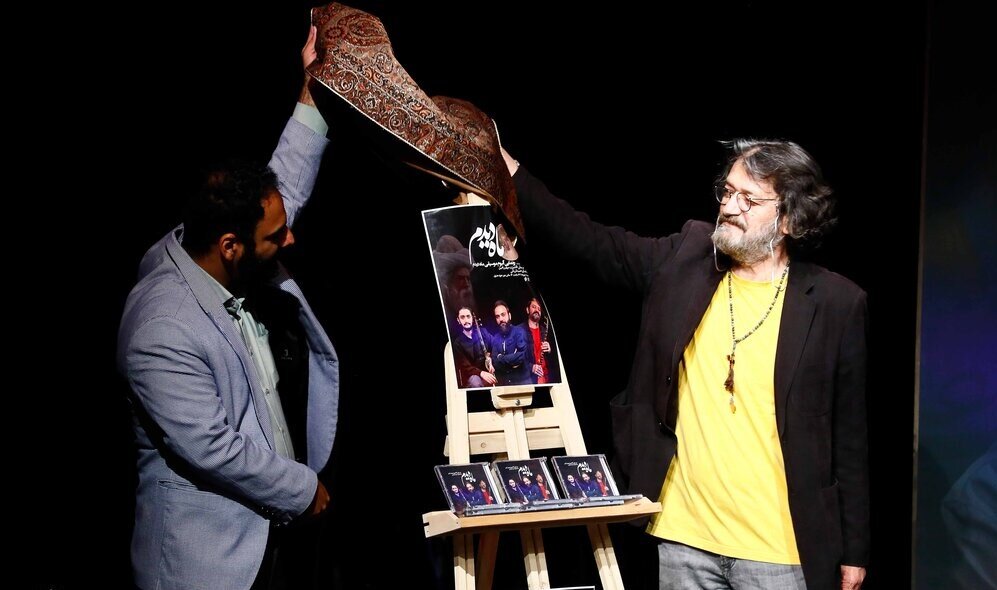Album blending Rumi's poetry, fusion music unveiled in Tehran

TEHRAN – In celebration of Rumi National Day, the unveiling ceremony for "Mah Didam" (I Saw the Moon), an album that blends fusion music with Rumi's poetry, was held at Tehran's Art Bureau on Saturday.
The album, created by Afshin and Sepehr Ramin, features vocalization by Hamid Qorbani and includes carefully curated poems from Rumi seamlessly set to music.
The ceremony was attended by a number of cultural figures, musicians, and scholars.
During his speech, Milad Erfanpur, the director of the Music Center of the Art Bureau, said that the album is an excellent and listenable creation in Iranian music.
He went on to say that if Rumi, one of the greatest and inseparable parts of Iranian cultural heritage, wisdom, and philosophy, is to be introduced, the best way to do so is through the language of music.
Moreover, the art of music has a history with Rumi and his works, especially the selected poems in this album, he added.
In the current era, where many works have a commercial purpose, releasing works such as "Mah Didam" is a valuable contribution that needs to be supported and promoted in order to preserve such works and artists within the society, he noted.
Renowned researcher and music critic, Mir Alireza Miralinaqi, also spoke at the event, highlighting Rumi's position as the greatest spiritual epic poet of humanity whose works are highly regarded by western critics.
The music in this album has been created based on Rumi's poetry, but it goes beyond that limitation, he stated.
Additionally, Rumi is a symbol of multiculturalism and not limited to any particular nation, therefore, Rumi's presence in the album is not only a representation of Iranian music, but rather a reflection of a global appeal, he mentioned.
Afshin Ramin, the composer of the album, spoke about the background of the album and its creation.
“We decided to commit our efforts and creativity to deliver a work of significant value,” he said.
For his part, the head of the Iranian Music Society, Amirabbas Setayeshgar, emphasized the importance of music in Iranian religious culture.
Iranian music is simple and has a straightforward rhythm and the music itself preaches reminders and guidance, which are crucial elements of Iranian religious art, he added.
Qorban Valiei, a professor in Persian Language and Literature, also discussed the significance of Rumi studies in this gathering and stated: "Silence holds significant importance in Rumi studies since he has made numerous references to it.”
He believed that a specific type of music not only does not hinder the creation of a silent mind, but rather prepares the grounds for the listener's mind to become silent, he mentioned.
Molana Jalal ad-Din Rumi (1207 to 1273) is one of the most widely recognized and celebrated poets in the world. His works have been translated into multiple languages and continue to inspire readers globally. Rumi's spiritual teachings and poetry have deeply influenced the entire Islamic world.
Rumi was born in present-day Afghanistan and later migrated to Konya, Turkey, where he lived most of his life and wrote the majority of his works.
Rumi's poetry is known for its spiritual and philosophical themes, particularly its focus on the search for truth and the divine. His most famous work, the Mathnawi, is a series of six books containing thousands of couplets that explore such themes as love, friendship, and the nature of God.
Photo: Left to right, Milad Erfanpur, the director of the Music Center of the Art Bureau and Afshin Ramin, the composer of “Mah Didam” music album, unveil the album at Tehran's Art Bureau on September 30, 2023.
SAB/
